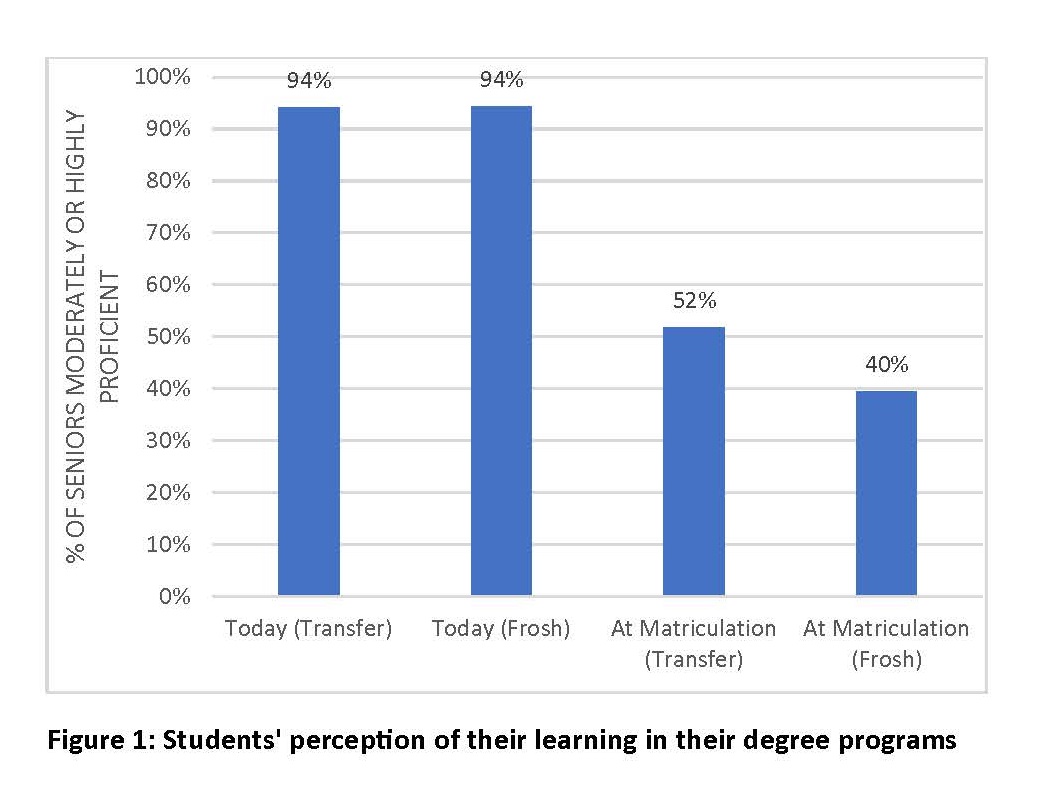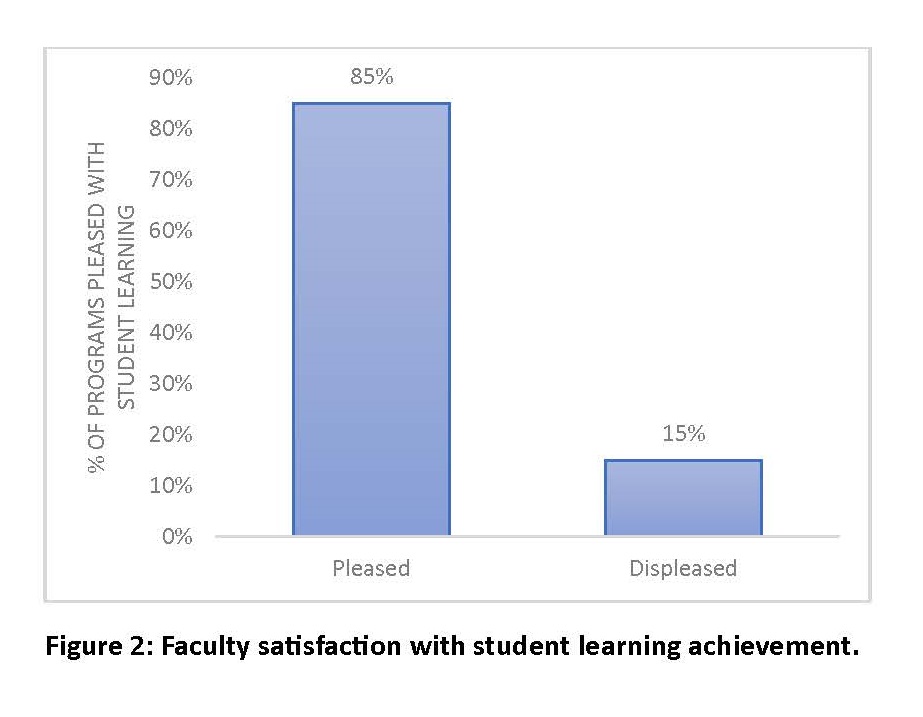Overview
Annually, the faculty of each undergraduate major, standalone minor, and required General Education courses examine student achievement of at least one intended learning outcome for their degree program. Through this work, the faculty confirm students are developing the skills and knowledge expected of a graduate in their discipline.
For the academic year 2023-24, this page provides a summary of
- students’ self-perceptions of their knowledge and abilities,
- the faculty’s conclusions about student learning achievement in undergraduate majors, standalone minors,and required General Education courses,
- actions identified to improve student learning, and
- budget implications for proposed improvements to student learning
Links to the intended learning outcomes for each degree are available here. An overview of the annual assessment process is available here. Undergraduate retention and graduation rates are available here.
Please address questions to Laura Martin.
Student Perceptions of their Learning
Across all majors, a large majority of seniors1 reported being highly or moderately proficient at the skills and knowledge expected of a graduate from their major (Figure 1). These results are similar across the past five years (2018-19, 2019-2020, 2020-2021, 2021-2022, and 2022-2023), indicating that disruptions due to remote instruction at the end of spring 2020 and in AY 2020-2021 did not lead to lower perceived levels of learning achievement among students.
five years (2018-19, 2019-2020, 2020-2021, 2021-2022, and 2022-2023), indicating that disruptions due to remote instruction at the end of spring 2020 and in AY 2020-2021 did not lead to lower perceived levels of learning achievement among students.
These seniors also perceived growth in their knowledge and abilities while at UCM. Only 2 out of 5 seniors who matriculated at UC Merced as frosh (40%) and just over 1 out of 2 students who matriculated at UC Merced as transfers (52%) recalled having high or moderate levels of proficiency in skills and knowledge particular to their major at matriculation.
Results from the spring 2024 administration of the University of California Undergraduate Experience survey, which tracks students' perceptions of their growth2 in a core set of skills and knowledge expected of a bachelor’s degree recipient, is not yet available. This will be added to this site at a later date.
Faculty Perceptions of Student Learning
Eleven out of thirteen programs (85%) were pleased with the skills and knowledge demonstrated by students in relation to the intended learning outcomes (Figure 3).3 This indicates that, on the whole, students were achieving program benchmarks or were otherwise meeting or exceeding the faculty's performance expectations.
In drawing these conclu sions, faculty examined diverse types of student work. These included course embedded quizzes, homeworks, final projects, research papers, experimental lab reports, and capstone projects.
sions, faculty examined diverse types of student work. These included course embedded quizzes, homeworks, final projects, research papers, experimental lab reports, and capstone projects.
One additional program was engaged in assessment in 2023-2024, but are not included in the percentages above as their work was not structured to determine students' achievement of a specific learning outcome at the time of graduation
Faculty Actions to Improve Student Learning
While the majority of programs (85%) were pleased with student performance, all responded to assessment results by identifying actions to support continued improvement in student learning. The two (15%) of programs that were slightly displeased recommended increasing alignment with prerequisite courses, ensuring that students are able to recognize relevant problem types, and clarifying assignment expectations.
Example actions included collaboration with the Center for Engaged Teaching and Learning, curriculum mapping, scaffolding student learning, providing more opportunities for students to develop project management skills, increasing emphasis on theoretical schools and critical methods, and metacognitive reflection assignments.
Budget Implications of Actions to Improve Student Learning
Programs identifying actions to improve student learning focused on actions that could be accomplished with existing resources.
Faculty Commitment to Examing Student Learning in Majors, Minors, and General Education
UC Merced faculty demonstrated commitment to systematically examining the effectiveness of their degree programs in cultivating intended student learning. In 2023-24, 100% of majors (n=13) submitted a report describing their efforts to assess student achievement of intended learning outcomes.4 No reports were submitted in 2023-24 for the general education program or for stand alone minors.
Student Achievement: Graduation and Retention Rates
For information on undergraduate retention and graduation rates, visit the Center for Institutional Effectiveness website.
1Data from the 2024 Graduating Senior Survey. Values are averages across all students. For each learning outcome for their major, graduating seniors rated themselves as highly proficient, moderately proficient, barely proficient, or not proficient for two time points: the time they took the survey (Today) and, retrospectively, when they started at UCM (When started at UCM).
2 Data from the Spring 2024 University of California Undergraduate Experience Survey (UCUES). This survey is administered once every two years. For each skill responding seniors rated their abilities as excellent, very good, good, fair or poor for two time points: as seniors and when they started UC Merced as freshmen.
3 As represented in the annual learning outcome report submitted by each program, including major, standalone minor, and required General Education courses (n=14). For each report, faculty conclusions regarding student learning outcomes were aligned to a Likert scale of very pleased, pleased, somewhat pleased, somewhat displeased, displeased, very displeased. In Figure 3 specifically, “Pleased” includes scores of very pleased, pleased, and somewhat pleased.
4Does not include programs in active program review.

